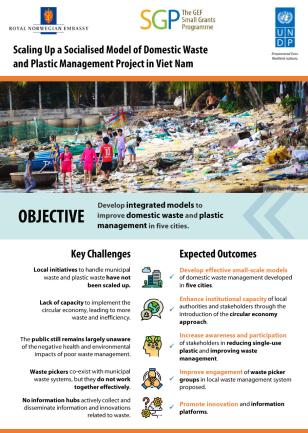Scaling up a socialised model of domestic waste and plastic management project in Viet Nam

Scaling up a socialised model of domestic waste and plastic management project in Viet Nam
March 30, 2020
Waste management has become a major concern in Viet Nam, as waste generation is increasing at an unprecedented pace and is projected to triple over the next 15 years. Currently, the country does not have the capacity to effectively handle this waste: 70% is disposed in landfills where the implementation of environmental standards is limited; while the rest is burned or discarded in nature, with much of it eventually ending up into the sea. The complex structure of solid waste management at the policy and governance level, together with the lack of reliable data and poor regional coordination worsen the situation. Citizens and businesses are not generally aware of the negative impacts improper waste management causes on human health, in addition to soil, air and water pollution; which calls for increased investment in education. Similarly, Viet Nam has become a major producer and consumer of plastic, with immediate negative consequences in terms of marine pollution, population wellbeing, and on the tourism and fishery industries. Finally, the circular economy approach is relatively unknown, while the linear economy (take, make, waste) is widely employed by business in Viet Nam.

 Locations
Locations